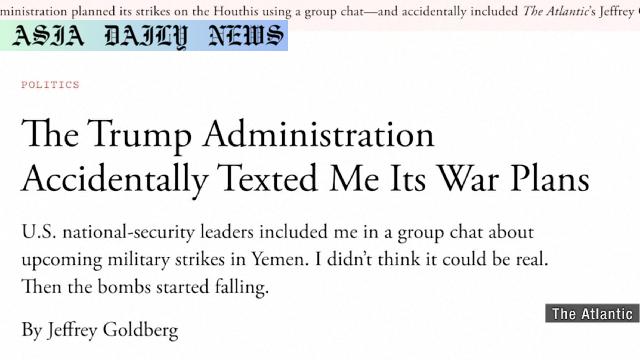Signal: The Atlantic unveils US military plans leaked via a chat group involving Trump officials, posing security risks.
Signal app revealed sensitive military operations by Trump officials.
The Atlantic published screenshots of detailed attack plans.
Exposed plans included timelines, weapons, and strike details.

Introduction to the Security Breach on Signal
The recent revelation by The Atlantic magazine about leaked US military plans shared on Signal has raised critical concerns regarding operational security and the responsible use of communication platforms by high-ranking officials. The disclosures include screenshots of detailed military strategies, shared inadvertently in a chat group—including timelines, weapons used, and attack plans—potentially endangering lives and national security. This incident serves as a stark reminder of the delicate balance between technology’s convenience and its misuse in matters of grave importance.
What Happened: Key Messages Shared on Signal
The leak centers on a Signal group chat involving President Donald Trump’s senior national security team discussing a military operation targeting Yemen’s Houthi rebels. The Atlantic detailed that March 15 attack plans were shared through messages. National Security Advisor Mike Waltz created the Signal chat, which later included postings by Defense Secretary Pete Hegseth showcasing explicit military details, such as maps of proposed bombings, Tomahawk missile strikes, and aerial drone operations via FA-18s. The Atlantic then published these communications on Wednesday, complete with images of the messages, intensifying security alarm bells.
Consequences of This Alarming Disclosure
The repercussions of such disclosures could be catastrophic. The Atlantic warns that hostile entities gaining access to these sensitive operational details, or even accidental sharing on social platforms, would undermine the safety of American forces and jeopardize mission success. The leaked intel, described as “surprise attack” plans, was highly classified in nature. Had it reached adversaries before execution, the consequences could have been devastating, including exposing American pilots to direct counter-attacks and hindering military objectives.
Accountability and Trump Administration’s Response
President Donald Trump has downplayed the magnitude of the breach, stating that the communications did not contain classified data. Moreover, he has signaled no intentions to hold any senior officials accountable, including National Security Advisor Mike Waltz, who established the chat thread. This lack of accountability has drawn criticism from various quarters, bringing into question the administration’s commitment to operational security and adherence to protocols for handling sensitive information.
Implications for Operational Security Policies
The incident underscores the pressing need for stringent operational security measures. The use of commercial messaging apps like Signal for discussing military strategies raises profound concerns about data safety, encryption reliability, and risk to national interests. This breach acts as both a cautionary tale and a call to action for policymakers to reassess guidelines for disseminating sensitive information in the digital age. Strengthened protocols, secure communication platforms, and rigorous accountability measures are imperative to prevent similar security lapses in the future.
Lessons Learned and Moving Forward
For military and civilian leaders alike, this incident presents an opportunity to analyze the vulnerabilities posed by inadequate or careless use of digital tools. It highlights the importance of emphasizing the secure handling of sensitive data while fostering a culture of accountability. Moving forward, regulatory frameworks must address not only technological safeguards but also outline clear consequences for misuse, ensuring no compromises can jeopardize strategic operations or personnel safety.
Commentary
Understanding the Gravity of the Signal Breach
The recent exposure of sensitive military plans through Signal serves as a chilling reminder of the risks associated with improper digital communication practices. Such an incident not only undermines national security but also raises questions about the judgment of individuals entrusted with safeguarding classified information. For a critical operation involving potential attacks, secrecy is paramount, and leaks—whether intentional or accidental—can have far-reaching consequences.
The Role of Communication Tools in Sensitive Operations
Signal, a highly encrypted messaging app, is lauded for its privacy features. However, its use in this context highlights the tension between technological convenience and stringent security requirements. Even the most secure digital platforms are not immune to human error or lapses in judgment. This breach points to the necessity of robust training for officials tasked with handling classified information, ensuring they understand both the risks and the protocols for secure communication.
Accountability and Leadership in Preventing Future Breaches
Leadership plays a pivotal role in fostering a culture of accountability. President Trump’s dismissive response to this breach reflects poorly on the administration’s approach to operational security. Without consequences for such glaring oversights, the integrity of security protocols risks being further eroded. It is essential for leaders to model accountability, demonstrating that even unintentional errors necessitate corrective action and institutional learning.
Broader Implications and Lessons for the Digital Age
This incident is not just about one breach; it is a symptom of broader issues in managing sensitive operations in the digital age. Policymakers must prioritize creating secure communication frameworks tailored to the unique demands of military and governmental use. They must also ensure strict oversight mechanisms, preventing similar incidents in the future. In an era where information is power, safeguarding it must remain the highest priority for governments worldwide.


